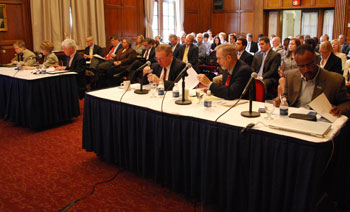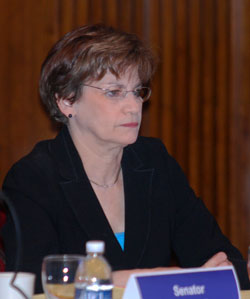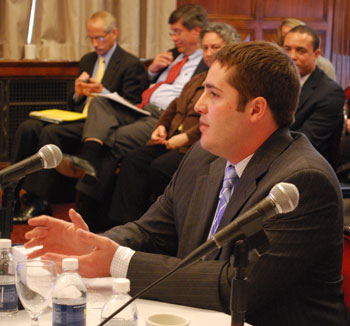UM Hosts Senate Hearing on Higher Ed

The Vandenberg Room at the Michigan League was packed for a state legislative hearing on funding for higher education.
The three presidents of institutions in Michigan’s University Research Corridor – backed by students and economic development leaders from each region – testified at a state Senate Higher Education Subcommittee hearing on Friday held in Ann Arbor, making a plea for additional state funding. But while legislators at the hearing acknowledged the importance of higher education, they also gave a bleak outlook for Michigan’s financial health, with one senator describing state revenues as “almost in a freefall.”
State Sen. Jim Barcia, a Democrat from Bay City, told the 50 or so people gathered at the Michigan League that a revenue estimate released earlier in the day was “worse news than anticipated.” The Senate Fiscal Agency estimated that revenues could be $2.1 billion lower than projected for the coming fiscal year, which begins Oct. 1. Even in the current fiscal year, the state faces a $1.3 billion deficit that has prompted another round of cuts. Despite that, Barcia said the students who testified on Friday – including a recent University of Michigan graduate who has launched a new company – gave him reason for optimism.
Following comments from legislators, including Ann Arbor’s state Sen. Liz Brater, the hearing began with testimony from UM president Mary Sue Coleman. [.pdf file of Coleman's opening and closing remarks] Mentioning initiatives at Michigan State University and Wayne State University (the two other institutions in the University Research Corridor), Coleman then described UM’s purchase of the former Pfizer research campus as an example of the university’s contribution to the local economy. The site will eventually include an incubator for the private sector and is expected to add nearly 3,000 jobs to the area over the next 10 years, she said.

State Sen. Liz Brater (D-Ann Arbor) is a member of the Senate Higher Education Subcommittee and attended Friday's hearing in Ann Arbor.
“As with many of our respective projects, not only will we broaden our contributions as a research university, we also will stimulate new business in region,” Coleman said. “We believe the two objectives go hand-in-hand.”
Testimony from MSU president Lou Anna Simon and Jay Noren, president of Wayne State, highlighted contributions that their institutions make to the state’s economy as well. Those remarks were followed by testimony from leaders of economic development agencies that work closely with the three universities: David Hollister, president of Prima Civitas in Lansing; Randal Charlton, executive director of TechTown in Detroit; and Mike Finney, CEO of Ann Arbor SPARK.
Finney recalled the history of his organization, which was founded in part with the backing of UM. He read an excerpt from an April 16 Detroit Free Press article, which described Ann Arbor as a hub for startups and venture capital, and which reported that UM and SPARK were the two most-cited reasons that entrepreneurs located in Ann Arbor.
Finney’s comments echoed remarks he’d made at a May 11 Partnership for an Innovation Economy forum hosted by UM. He said that the relationship between UM and SPARK is critical in four ways: 1) providing access to talent, 2) helping create and bolster entrepreneurial ventures, 3) helping work with existing businesses, and 4) assisting with business transformation, specifically in transitioning from an economy dominated by auto manufacturing to one that’s fostering emerging industries. He concluded by saying that you couldn’t separate the economic development agencies from the universities they work with and get the same same results. He urged legislators to support funding for higher education, and in particular for the University Research Corridor institutions.
Three students, one from each of the URC universities, testified as well. Jeff LeBrun recently graduated from UM’s Erb Institute with an MBA and graduate degree from the School of Natural Resources & Environment. He described how a company he co-founded, Algal Scientific, recently won the Clean Energy Prize, a $65,000 award from DTE Energy to encourage the commercialization of clean energy technologies. Their company is developing treatments for municipal and industrial wastewater, with a byproduct that can be used for biofuels.
LeBrun said he didn’t come to UM intending to be an entrepreneur, but during his studies he encountered the kinds of resources and training that led him in that direction. He said he has his eye on the incubator site that UM plans to start in the former Pfizer campus. “That’d be a great place to set up shop,” he said.
The five senators at the hearing had questions and comments after the testimony. Sen. Bill Hardiman, a Republican from Kentwood, cited state revenues that were disappearing “almost in a freefall” and asked if online education was being considered as a way to curb capital outlays. UM’s Coleman told him that online education was not inexpensive, and that while all the universities have worked on ways to economize – and “gladly” take on economic development efforts – “none of this comes without cost,” she said. MSU’s Simon noted that Michigan is falling behind in building research lab space, and that’s an important capital outlay for the state.
In her remarks, Brater said that every dollar invested in higher education generates $25 in spinoff economic benefits. Noting that her spouse is a faculty member of UM’s English and theater departments, she said that investment in the arts and humanities also relates to economic development. She mentioned that John Warner, a pioneer in green chemistry, had recently spoken at the Ecology Center’s annual meeting, where he’d criticized science education for not teaching about environmental impact. She asked what the universities were doing in that regard.

UM president Mary Sue Coleman, center, listens to testimony given by university students at Friday's hearing. She is flanked by MSU president Lou Anna Simon and Wayne State president Jay Noren.
Coleman said that one of the Erb Institute’s principles was to look at the environmental impact of a product or building’s life cycle. That issue is coming to the fore across all disciplines, she said. MSU’s Simon quipped, “I’m always for green anything.”
Brater also asked for an update on how the URC is leveraging federal research dollars. Coleman said they’d be releasing their third annual report with details on that topic at the Mackinac Policy Conference later this month. (Coleman will be on a panel there, along with former UM regent David Brandon of Domino’s Pizza, titled “Changing the Environment in Michigan to Encourage Growth through Innovation.”)
Sen. Glenn Anderson, a Democrat from Westland, asked how universities were preparing for the inevitable likelihood of declining state support, at least over the next several years. He said that once federal stimulus funds coming into the state were used, Michigan would be in an even worse situation financially.
Simon said that working collectively, as the URC institutions are doing, is one strategy. But she told legislators they need to ensure that the value of a degree appreciates over time, and that higher education in the state is a magnet. “If we can’t do that, the numbers will only get worse,” she said. The universities are going through internal budget reductions, while maintaining a strong commitment to financial aid. Quality of and access to education are key, she said, as is research to drive the future of Michigan.
Coleman said there’s a correlation between the education of the population and the prosperity of the state. She told lawmakers that the state government needs to grapple to find a revenue model for the 21st century, and that she didn’t envy their jobs. She said the universities must have both quality and access, and noted that “it costs a lot to do what we do.”
Our coverage ended as the hearing took a break. Later in the day, the committee was to hear testimony from UM-Dearborn executives and Mike Boulus, executive director of the Presidents Council, a group representing the state’s 15 public universities.




